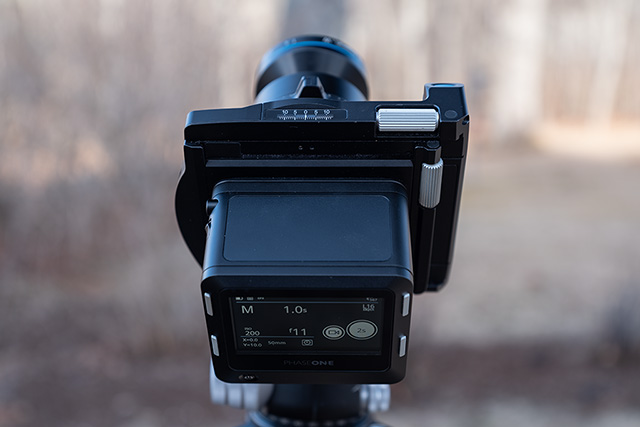150 megapixels in black & white: See our first real-world Phase One XT IQ4 150MP Achromatic images
posted Wednesday, March 30, 2022 at 2:30 PM EDT
Click here to view our Phase One XT IQ4 150MP Achromatic Gallery

In September 2019, Phase One announced its XT camera system. Like the Phase One XF camera, the Phase One XT camera works with Phase One's fantastic medium-format digital backs, including the most recent IQ4 digital back series. Unlike the Phase One XF, the Phase One XT camera is thin and lightweight. At a basic level, the XT is essentially a metal frame. You attach a digital back and a Rodenstock XT lens, which includes an integrated X-Shutter, and you're good to go. In terms of controls, the XT camera itself includes just a shutter release. Well, that's not strictly true. The XT camera also includes two precision-built adjustment knobs that allow the user to shift the X and Y axes, each by 24mm. It may not sound like a lot, but in use, the effect of the shift is dramatic.

Phase One has primarily designed its new XT camera for landscape photographers. More specifically, the XT is aimed at landscape photographers who demand the absolute best in image quality. Personally, I love landscape photography. When pressed, I describe myself as a landscape photographer. It's by far my favorite genre. So, when I got to briefly go hands-on with the Phase One XT ahead of its launch in 2019, the camera instantly piqued my interest. When I got the chance to go hands-on with the XT camera again, it was a no-brainer. This time, I got to also try out Phase One's IQ4 150MP Achromatic digital back.

Before continuing, let's get something out of the way. Phase One digital backs, and the requisite lenses, are costly. The XT camera, IQ4 150MP back, and Rodenstock 50mm F4 lens I used retail for around $62,500 in a bundle. It's well outside of my, and most other people's, budgets. That said, the cutting edge is expensive. Phase One and Rodenstock spare no expense and they don't overlook any detail. In use, the attention to detail is immediately evident. When viewing your image files, the incredible quality of the IQ4 digital back and Rodenstock's lenses are obvious. 'Worth' and 'value' are subjective terms, so I'll leave the question about if the Phase One camera system is worth its high barrier to entry entirely to the side for now.

Why did I choose to use the Achromatic digital back, rather than a more traditional 150MP color sensor? Beyond the basic reason that I really enjoy black and white photography, I also have never shot with a dedicated black and white camera before. It seemed like a good opportunity to try something new. Phase One doesn't make a monochromatic digital back, by the way, it's achromatic. That isn't a turn of phrase, it's a fundamental difference in technology. The 150-megapixel image sensor lacks a colored bayer sensor filter and the infrared cut filter found in nearly every camera. It can receive light outside the visible spectrum. Further, the digital sensor produces completely uninterpolated images. I'll go into more detail in my upcoming Hands-on Review, but the basic gist is that light, across a wide range of wavelengths, is captured directly by each pixel. The result is an extremely sharp, detailed image with fantastic tonal transitions and dynamic range.


It's one thing to shoot in color and then convert your images to black and white in your photo editor of choice. It's another thing entirely to shoot with a camera that only shoots achromatic, or monochromatic, images. How I had to adapt my photography and how the photographic experience itself was ultimately expanded by the XT and the IQ4 150MP Achromatic sensor will be the focus of my Hands-on Review. As I continue to process my images and work on the review, you can download a batch of real-world images in our Gallery right now. From there, you can download full-size RAW and converted JPEG files. As a note, while Phase One RAW (.iiq) files can be opened in different software, I highly recommend using Capture One 22. A free trial of the photo editor is available to download directly from Capture One.


